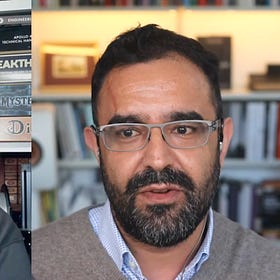🔮 Will AI agents enter your business this year?; economic efficiency vs. welfare; modelling breakdown; Tot-AI-l Football ++ #466
Hi, I’m Azeem Azhar. In this week’s edition, we explore
The potential of AI agents
A Nobel laureate’s critique of mainstream economics
How climate models struggle to keep pace with reality
I published my latest conversation with one of the leading researchers working at the intersection of generative AI, education and work, Ethan Mollick. We discuss our favourite use cases for genAI, how you should think about implementation and what students should be learn in a world of AI.
🔥 Unleashing the power of AI, with Ethan Mollick
This is a must-listen for anyone who’s even remotely interested in implementing AI in their work and organisation. Share widely. Ethan Mollick is an Associate Professor at the Wharton School of the University of Pennsylvania, where he studies and teaches innovation, entrepreneurship, and AI’s impact on work and education. I think of him as the Jacques Cousteau of dee…


